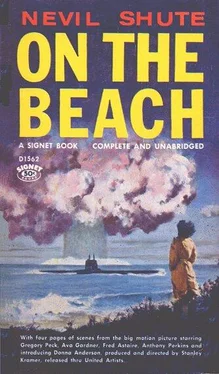"When were you at Cairns?"
"About a fortnight ago."
"I suppose the intensity at Cairns would be worse by now."
"Probably so. I’d say it gets worse steadily as times goes on. Finally, of course, it’ll get to the same level all around the world."
‘They’re still saying that it’s going to get here in September."
"I would say that’s right. It’s coming very evenly, all around the world. All places in the same latitude seem to be getting it just about the same time."
"They were saying on the wireless they’ve got it in Rockhampton."
The captain nodded. "I heard that, too. And at Alice Springs. It’s coming very evenly along the latitudes."
His host smiled, a little grimly. "No good agonizing about it. Have another whisky."
"I don’t believe I will, not now. Thank you."
Mr. Davidson poured himself another small one. "Anyway," he said, "it comes to us last of all."
"That seems to be so," said Dwight. "If it goes on the way it’s going now, Cape Town will go out a little before Sydney, about the same time as Montevideo. There’ll be nothing left then in Africa and South America. Melbourne is the most southerly major city in the world, so we’ll be near to the last." He paused for a moment in thought. "New Zealand, most of it, may last a little longer, and, of course, Tasmania. A fortnight or three weeks, perhaps. I don’t know if there’s anybody in Antarctica. If so, they might go on for quite a while."
"But Melbourne is the last big city?"
"That’s what it looks like, at the moment."
They sat in silence for a little while. "What will you do?" the grazier asked at last. "Will you move your ship?"
"I haven’t decided that," the captain said slowly. "Maybe I won’t have to decide it. I’ve got a senior officer, Captain Shaw, in Brisbane. I don’t suppose he’ll move because his ship can’t move. Maybe he’ll send me orders. I don’t know."
" Would you move, if it was at your own discretion?"
"I haven’t decided that," the captain said again. "I can’t see that there’s a great deal to be gained. Nearly forty per cent of my ship’s company have got themselves tied up with girls in Melbourne—married, some of them. Say I was to move to Hobart. I can’t take them along, and they can’t get there any other way, and if they could there’s nowhere there for them to live. It seems kind of rough on the men to separate them from their women in the last few days, unless there was some compelling reason in the interest of the naval service. He glanced up, grinning. "Anyway, I don’t suppose they’d come. Most of them would probably jump ship."
"I suppose they would. I think they’d probably decide to put the women first."
The American nodded. "It’s reasonable. And there’s no sense in giving orders that you know won’t be obeyed."
"Could you take your ship to sea without them?"
"Why, yes—just for a short run. Hobart would be a short trip, six or seven hours. We could take her there with just a dozen men, or even less. We wouldn’t submerge if we were as short-handed as that, and we couldn’t cruise for any length of time. But if we got her there, or even to New Zealand—say to Christchurch—without a full crew we could never be effective, operationally." He paused. "We’d be just refugees."
They sat in silence for a time. "One of the things that’s been surprising me," the grazier said, "is that there have been so few refugees. So few people coming down from the north. From Cairns and Townsville, and from places like that."
"Is that so?" the captain asked. "It’s just about impossible to get a bed in Melbourne—anywhere."
"I know there have been some. But not the numbers that I should have expected."
"That’s the radio, I suppose," Dwight said. "These talks that the Prime Minister’s been giving have been kind of steadying. The A.B.C.’s been doing a good job in telling people just the way things are. After all, there’s not much comfort in leaving home and coming down here to live in a tent or in a car, and have the same thing happen to you a month or two later."
"Maybe," the grazier said. "I’ve heard of people going back to Queensland after a few weeks of that. But I’m not sure that that’s the whole story. I believe it is that nobody really thinks it’s going to happen, not to them, until they start to feel ill. And by that time, well, it’s less effort to stay at home and take it. You don’t recover from this once it starts, do you?"
"I don’t think that’s true. I think you can recover, if you get out of the radioactive area into a hospital where you get proper treatment. They’ve got a lot of cases from the north in the Melbourne hospitals right now."
"I didn’t know that."
"No. They don’t say anything about that over the radio. After all, what’s the use? They’re only going to get it over again next September."
"Nice outlooks" said the grazier. "Will you have another whisky now?"
"Thank you, I believe I will." He stood up and poured himself a drink. "You know," he said, "now that I’ve got used to the idea, I think I’d rather have it this way. We’ve all got to die one day, some sooner and some later. The trouble always has been that you’re never ready, because you don’t know when it’s coming. Well, now we do know, and there’s nothing to be done about it. I kind of like that. I kind of like the thought that I’ll be fit and well up till the end of August and then—home. I’d rather have it that way than go on as a sick man from when I’m seventy to when I’m ninety."
"You’re a regular naval officer," the grazier said. "You’re probably more accustomed to this sort of thing than I would be."
"Will you evacuate?" the captain asked. "Go someplace else when it gets near? Tasmania?"
"Me? Leave this place?"the grazier said. "No, I shan’t go. When it comes, I’ll have it here, on this verandah, in this chair, with a drink in my hand. Or else in my own bed. I wouldn’t leave this place."
"I’d say that’s the way most folks think about it, now that they’ve got used to the idea."
They sat on the verandah in the setting sun till Moira came to tell them that tea was ready. "Drink up," she said, "and come in for the blotting paper, if you can still walk."
Her father said, "That’s not the way to talk to our guest."
"You don’t know our guest as well as I do, Daddy. I tell you, you just can’t get him past a pub. Any pub."
"More likely he can’t get you past one." They went into the house.
There followed a very restful two days for Dwight Towers. He handed over a great bundle of mending to the two women, who took it away from him, sorted it, and busied themselves over it. In the hours of daylight he was occupied with Mr. Davidson upon the farm from dawn till dusk. He was initiated into the arts of crutching sheep and of shovelling silage up into a cart and distributing it in the paddocks; he spent long hours walking by the bullock on the sunlit pastures. The change did him good after his confined life in the submarine and in the mother ship; each night he went to bed early and slept heavily, and awoke refreshed for the next day.
On the last morning of his stay, after breakfast, Moira found him standing at the door of a small outside room beside the laundry, now used as a repository for luggage, ironing boards, gum boots, and junk of every description. He was standing at the open door smoking a cigarette, looking at the assortment of articles inside. She said, "That’s where we put things when we tidy up the house and say we’ll send it to the jumble sale. Then we never do."
He smiled. "We’ve got one of those, only it’s not so full as this. Maybe that’s because we haven’t lived there so long." He stood looking in upon the mass with interest. "Say, whose tricycle was that?"
Читать дальше












